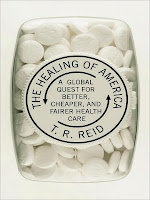 It has been a monumental week, no matter what side of the political fence you sit on. This week, the President of the United States signed healthcare reform into law. Now, I am not here to debate arguments, the situation or the yet-to-be-seen outcomes. I think we can all agree that our system is not a perfect one and it’s one that could benefit from some form of redesign. So that’s what I took a look at this week, turning to a non-partisan, highly informative and tremendously fascinating book: THE HEALING OF AMERICA: THE GLOBAL QUEST FOR BETTER, CHEAPER, AND FAIRER HEALTH CARE by T.R. Reid.
It has been a monumental week, no matter what side of the political fence you sit on. This week, the President of the United States signed healthcare reform into law. Now, I am not here to debate arguments, the situation or the yet-to-be-seen outcomes. I think we can all agree that our system is not a perfect one and it’s one that could benefit from some form of redesign. So that’s what I took a look at this week, turning to a non-partisan, highly informative and tremendously fascinating book: THE HEALING OF AMERICA: THE GLOBAL QUEST FOR BETTER, CHEAPER, AND FAIRER HEALTH CARE by T.R. Reid.
I found the individual country case studies fascinating. France has successfully converted to a completely digitized medical record all contained on a microchip that is affixed to a credit-card sized piece of plastic (a system, ironically enough, that was created by Americans). Preventive care is the focus of many of our European counterparts. Japanese citizens have access to over 2,000 health plans and can see a specialist immediately – often without an appointment.
Now, I am touting the pluses; but Reid goes into an objective analysis showing the successes and failures of each country’s system. He speaks to top health officials, health reformers and providers along the way creating a full picture of how other comparable nations are managing and providing health care. He breaks down a number of different models (of which the U.S. uses a little bit of every kind), myths (it’s not all socialized medicine outside of our contiguous 50 states) and realities (we are the only industrialized nation that doesn’t hold health care as a basic right for all its citizens).
Reid’s research found that American’s aren’t cold hearted. When polled, the vast majority are in favor of everyone having access to health care and think that most do. Unfortunately, there is a significant number of Americans who are uninsured, underinsured and unable to obtain health care. There is so much we can learn when looking at how others not just provide health care, but finance its delivery. There is tremendous opportunity to arm ourselves with information and knowledge to understand what we really have available and use that information to create a better, cheaper and fairer system.
I think Reid’s book is one tool to do just that.
Rating: 5 stars
Genre: Non-fiction
Pages: 288

Good review. Makes me want to read it!
Very timely…this sounds as if it was well-written so as not to confuse. I may check this one out!
I guess considering the health care issue it’s why Tommy Douglas was voted the all time Favourite Canadian in our country
Mom and Deejah: You can both borrow it!
Linda: There was actually a big part of the Canada case study about Tommy Douglas!
This book should be required reading for anyone who might for a second doubt the need for health care (or health insurance) reform in the U.S. For that matter, it should be required reading period. It’s an eye-opener for sure.